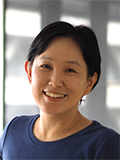Jun Tsuchiya

Commendation
Research on behaviors of Hydrogen in Earth’s materials based on ab initio calculations
A list of five major papers
- J. Tsuchiya, and K. Umemoto, First-principles determination of the dissociation phase boundary of phase H MgSiO4H2, Geophys. Res. Lett., 46, 7333-7336, 2019.
- Masayuki Nishi, Yasuhiro Kuwayama, Jun Tsuchiya, Taku Tsuchiya, 2017 The pyrite-type high-pressure form of FeOOH, Nature, 547, 205-208, doi:10.1038/nature22823
- J. Tsuchiya, 2013 First principles prediction of a new high pressure phase of dense hydrous magnesium silicates in the lower mantle, Geophysical Research Letters, 40, 4570-4573, doi:10.1002/grl.50875.
- J. Tsuchiya, and T. Tsuchiya, 2009 First-principles investigation of the structural and elastic properties of hydrous wadsleyite under pressure, J. Geophys. Res., 114, B02206, doi:10.1029/2008JB005841
- J. Tsuchiya, T. Tsuchiya, S. Tsuneyuki and T. Yamanaka, 2002 First principles calculation of a high-pressure hydrous phase, δ-AlOOH., Geophysical Research Letters, 29, 1909, doi:10.1029/2002GL015417
Major achievements
Jun Tsuchiya is studying the behavior of hydrogen in the earth’s internal materials, especially the physical properties of hydrous minerals under ultra-high pressure with large experimental constraints, by using the ab initio calculations. She elucidated the bonding state, elastic properties, and phase equilibria of hydrogen in various oxide and silicate minerals in conjunction with ultrahigh pressure experiments, and predicted the existence of an unknown hydrous mineral phase stable under lower mantle equivalent conditions. In addition, she is conducting advanced research, such as finding out that pressure-induced symmetrization of hydrogen bonds occurs in ultrahigh pressure, and clarifying its effect on physical properties and phase transition. In recent years, she has made significant contributions to understanding the structure and dynamics of the deep earth by conducting research on carbon-containing systems and participating in task forces at the Deep Carbon Observatory, an international and interdisciplinary community. For these reasons, her research is highly appreciated internationally.
Nominator
Eiji Ohtani
